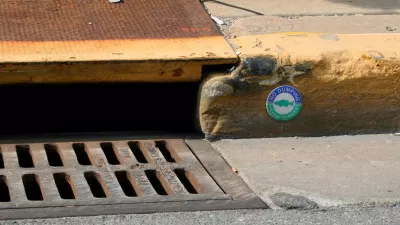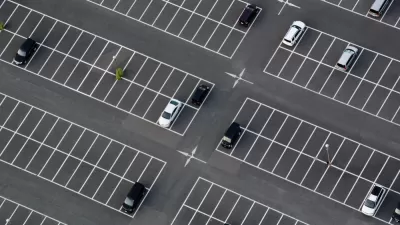United States
How a Private-Sector Approach Can Save Your Transit System
Is your city's transit agency caught in a cycle of rising fares, declining service, and chronic financial problems? Mark Aesch has used an innovative approach to turn around the bus systems in Rochester and Detroit. Could it work in your city?
Single Households: Older, Urban, Increasing, and More Sustainable
The number of single households has grown three-fold since the 1950s. More sustainable and more likely to live in cities than married households, singles experience a major problem: metro areas are not planned for them but for nuclear families.
Can the CIA Control Climate Change?
The CIA, in partnership with other U.S. government agencies, is funding a $630,000 scientific study into the plausibility and potential effects of climate engineering to reduce global warming. Let the conspiracy theories begin.
Focusing a Place-Based Lens on America's Health Disparities
In the U.S., were used to comparing our life expectancies with other countries, says Emily Badger, but in many cities one only needs to travel a mile to see decades of difference in average life spans. Stark new maps make these discrepancies clear.
Can the Cycle of Concentrated Poverty Be Broken?
A recent book examines the causes and effects of the 'persistent and long standing problem of concentrated poverty in the inner city' and offers recommendations for breaking the cycle. Do we have the commitment to fix the problem?
The Newest Thing in Mobile Commerce: The Book Truck
Inspired by the food truck movement, book-publisher Penguin Group (USA) has rolled out two new book-buying venues: the Penguin Book Truck, and the Penguin Book Pushcart.
America's Most Effective Urban Revitalization Incentives Under Threat
The low-income housing and new-markets tax credits are two of the most effective tools for stimulating affordable housing creation and the revitalization of low-income neighborhoods. Don't let them fall victim to tax reform, argues Michael Rubinger.

The High Cost of Free Curb and Gutter
The U.S. is in need of new approaches to managing stormwater. Though the EPA has been slow to provide guidance, there's plenty that can be done now. Parking reform provides a handy model for solving seemingly intractable entitlement problems.
Pursuing the 'American Dream' Can Be a Real Downer
Tight housing inventories, rising prices, and conservative mortgage lenders are preventing many would-be homeowners from buying their piece of the 'American Dream'. Michelle Higgins explains why this may actually be a good thing.
Foxx's First Goal: Find the Money!
Keith Laing, with help from Josh Schank of the Eno Center for Transportation, describes the reality facing the new Secretary of the Department of Transportation. With gas tax revenue dwindling and MAP-21 expiring next year, securing funds is crucial.
The Revolution Transforming America's Strained Water Systems
In the first in a series of articles exploring 'infrastructure solutions for the next generation', Cynthia Barnett examines the creative ways that communities are solving the problems caused by old and overtaxed water systems.
Climate-Caused Blackouts Ahead, Warns DOE
John M. Broder writes about a new U.S. Department of Energy report released July 11th that details the vulnerability of the nation's entire energy system to climate change effects - from droughts, intense storms, rising seas, lower river levels...
Master Planning is Back; Thank an Architect
In a feature article and provocative editorial, The Architect's Newspaper seeks to examine the lead role that architects are playing in 'laying out the future of cities'.
What is Poverty? Accounting for the True Expense of City Life
At $23,550, the federal poverty line is a blunt instrument used to measure the nuances of affordability. A tool provided by the Economic Policy Institute shows how much more a family needs to make for a modicum of security in cities across the U.S.
What is the Purpose of Planning?
After several years spent facing strong professional headwinds, former APA president Mitchell Silver is encouraged to see planners revitalizing the profession by embracing their roots.
Reputation Renewal: Reconsidering America's Master Builders
Over the last several years, successive books and exhibitions have sought to paint America's midcentury master builders in a new light, by focusing on their accomplishments. What can we learn from the 'post-war planning titans'?
Has President Obama Turned the Corner on Climate Change?
Analysts have noted a change in the president on climate change in his second term. Call it a "message shift". Rather than addressing it in terms of the need for clean energy and renewables, he now speaks directly to the perils of climate change.
1968 Inverted: Why the 'Back-to-the-City' Movement is 'White Flight' in Reverse
Calling 'white infill' the new 'white flight', Richey Piiparinen argues that urban thinkers need to consider whether the back-to-the-city trend is exacerbating inequity and segregation.

From Peak Car to Peak Parking?
Fewer cars on the road, less driving, why not fewer parking spots? Cities like D.C., L.A., Denver, Philadelphia are responding by reducing or eliminating parking minimums, while Portland, which had already eliminated them, are bringing them back.
Call Off the 'Peak Car' Celebrations
Planners and environmentalists have applauded the seven-year decline in America's auto ownership levels with understandable enthusiasm. But around the world, automobile production has never been higher.
Pagination
Urban Design for Planners 1: Software Tools
This six-course series explores essential urban design concepts using open source software and equips planners with the tools they need to participate fully in the urban design process.
Planning for Universal Design
Learn the tools for implementing Universal Design in planning regulations.
planning NEXT
Appalachian Highlands Housing Partners
Mpact (founded as Rail~Volution)
City of Camden Redevelopment Agency
City of Astoria
City of Portland
City of Laramie


































